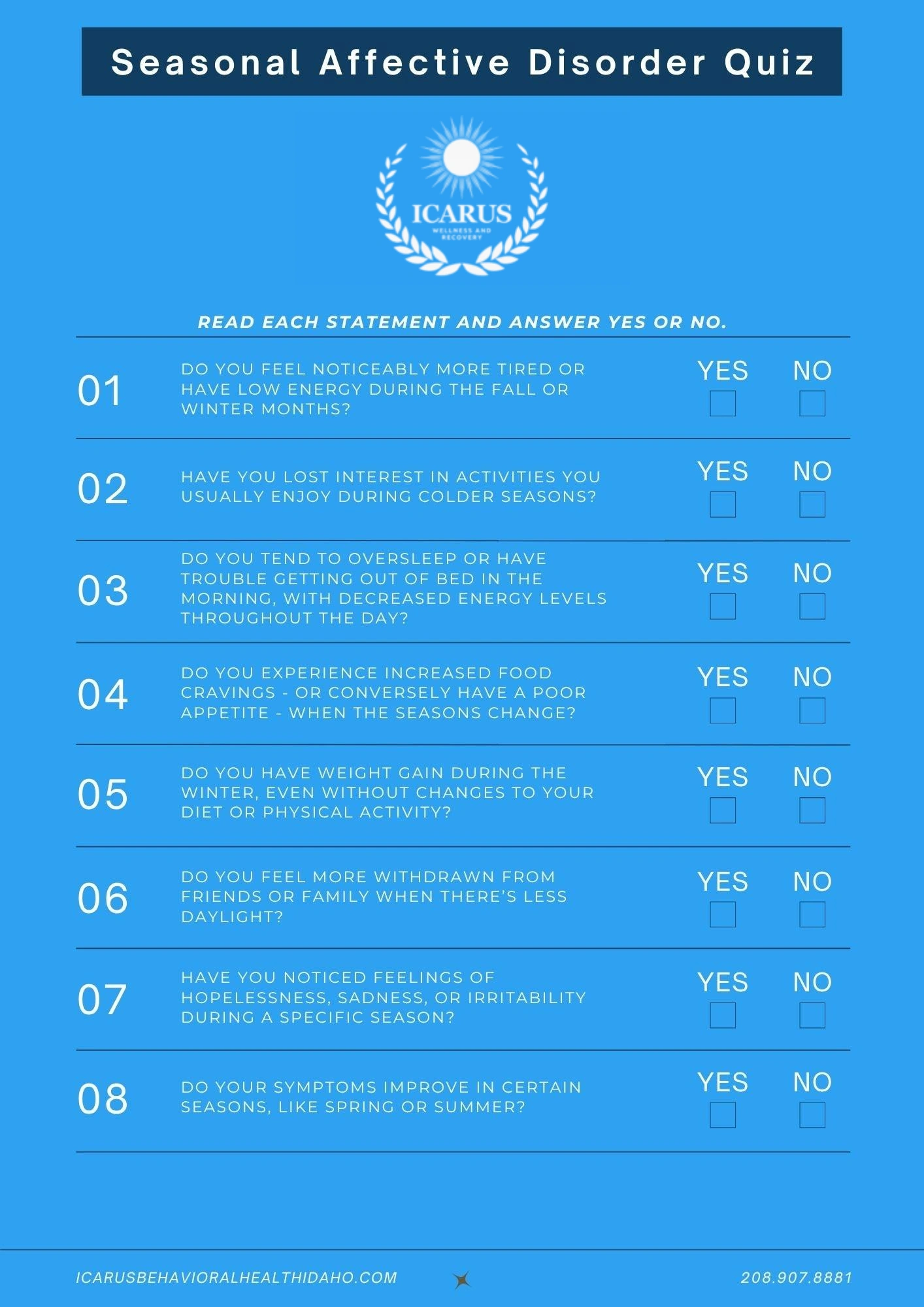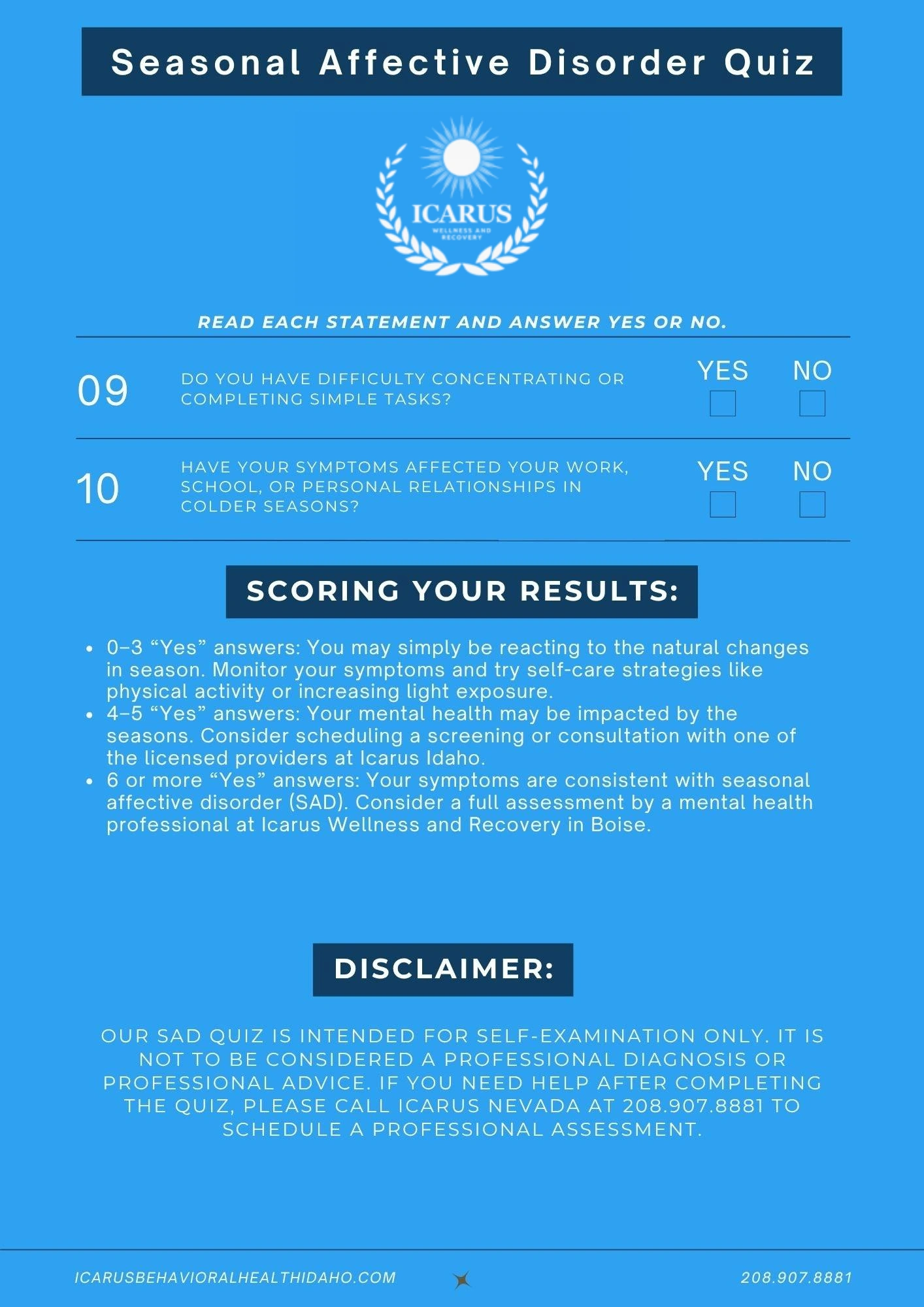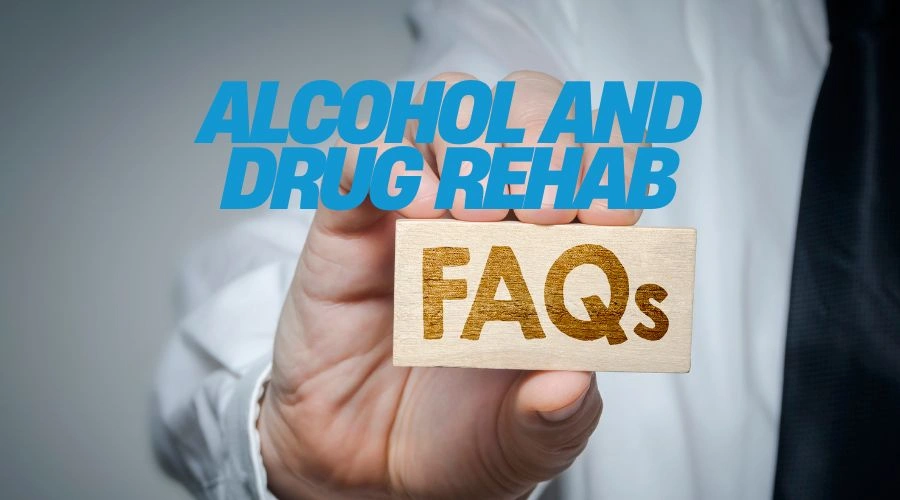A Quiz on Seasonal Depression Symptoms and Treatment Options
Do you start experiencing feelings of sadness or low moods in the fall or winter? Seasonal affective disorder (SAD) could be the reason for this seasonal pattern. Many people with SAD report seasonal depression, loss of motivation and energy, and excessive sleep.
Our Do I Have Seasonal Affective Disorder Quiz can help you decide if it’s time to seek professional help.
Icarus Wellness and Recovery, a JCAHO-accredited mental health treatment center in Boise, has helped others overcome the mental and physical symptoms of SAD, which usually occur in the darker winter months.
We know this condition is more than the winter blues – it can be a serious condition that can cause or co-occur with other mental health or mood disorders.
Our Seasonal Affective Disorder test is a starting point in your journey to recovery. It’s not a formal diagnostic tool or medical advice. Still, it guides you as you consider whether your depressive symptoms could be SAD.
Get Confidential Trauma and Mental Health Assessment
Take Our Seasonal Affective Disorder Test (Not an Official Diagnostic Tool)
If you have low levels of energy, anxiety, or depression as the seasons change and shift into the darker months with fewer daylight hours, you’re not alone. A 2019 study by Boston University found estimated that about 10 million Americans struggle with this seasonal condition, with women experiencing it at a rate four times higher than men.
Seasonal Affective Disorder usually starts in the late fall. That’s when fewer daylight disrupts the body’s natural circadian rhythms, the internal clock that regulates sleep, energy, and mood. The disruption can lead some people to feel depressed, fatigued, or withdrawn during the winter months. The seasonal light change also impacts neurotransmitter serotonin levels, which contributes to low moods.
If you identify the negative thought patterns and physical symptoms of SAD, call the admissions representatives at Icarus Idaho to schedule a professional consultation with a mental health professional to get a correct diagnosis. We’ll discuss your concerns confidentially – the call is free.
Seasonal Affective Disorder SAD: Common Symptoms Quiz
Our Seasonal Affective Disorder test asks you to reflect on the symptoms, aligning with the American Psychiatric Association’s Diagnostic and Statistical Manual (DSM-5) and the Canadian Mental Health Association’s diagnostic guidelines for diagnosing this mental disorder.
Print out our seasonal depression quiz and check any boxes that align with your symptoms. Note that many of these symptoms overlap with other diagnosable mental health conditions.
1 – Do you feel noticeably more tired or have low energy during the fall or winter months?
Sleepiness, low energy levels, and fatigue are classic SAD symptoms. Circadian rhythm disruptions disrupt several key hormones. That can lead some people to have struggles with sluggishness from late fall through the winter.
2 – Have you lost interest in activities you usually enjoy during colder seasons?
Losing interest in activities is a symptom of SAD and other forms of depression and mood disorders, including Bipolar Disorder. This question helps a mental health professional consider whether you lack o motivation indicates depression or another issue.
3 – Do you tend to oversleep or have trouble getting out of bed in the morning, with decreased energy levels throughout the day?
Hypersomnia – sleeping too long – is common in the winter months. It reflects the body’s response to lower light levels and leads to excessive sleep without receiving restorative benefits. This question helps separate seasonal affective disorder/SAD from insomnia resulting from anxiety or other types o depression.
4 – Do you experience increased food cravings – or conversely have a poor appetite – when the seasons change?
Another common signs of seasonal affective disorder is a change in appetite. Many people cope by eating when they feel depressed; others have less appetite and may have visible weight loss. Some people are also prone to drink more alcohol when the season changes to fall and winter.
Understanding this symptom can help prevent unwanted weight fluctuations, which can have an impact on your overall physical well-being and mental health.
5 – Do you have weight gain during the winter, even without changes to your diet or physical activity?
Unintentional weight gain can happen during certain seasons due to low levels of energy, using food as a coping tool, and less exercise. It’s measurable symptom experienced by many people with SAD and occurs along with other symptoms.
6 – Do you feel more withdrawn from friends or family when there’s less daylight?
Many withdraw socially and avoid family or friends because of seasonal depression. Isolation is their coping mechanism, but it only serves as further isolation from support systems.
Recognizing this common form of coping can help the person receive an accurate diagnosis and effective treatment plan.
7 – Have you noticed feelings of hopelessness, sadness, or irritability during a specific season?
Pervasive sadness, hopelessness, and mood swings are present in both seasonal affective disorder and other forms of depression. The differentiating factor for people with SAD is the presence of the moodiness or depression primarily in the winter.
8 – Do your symptoms improve in certain seasons, like spring or summer?
This question helps look for seasonal depression by considering whether the depression symptoms present themselves in the later days of fall or winter versus year-round.
Mental health improvements in the spring and summer strongly support an SAD diagnosis.
9 – Do you have difficulty concentrating or completing simple tasks?
Cognitive challenges are not always present in seasonal affective disorder but can be. When someone does experience them, they can significantly harm one’s daily functioning.
Trouble focusing and brain fog suggest serotonin disruption, which needs healing along with the mental health aspects of SAD.
10 – Have your symptoms affected your work, school, or personal relationships in colder seasons?
The DSM-5 requires that the physical and mental health symptoms of this type of depression lead to significant distress or social or occupational disruption. This interruption in daily living suggests severity that goes beyond a moody disposition and suggest a deeper mental health challenge.
Icarus Idaho Treats SAD, Improving Overall Mental Health
Icarus Idaho provides each client with evidence-based, holistic healing for seasonal depression and other mental health condition. With our expertise, you can reclaim your focus, energy, and happiness. We focus on mental health and other treatments to reclaim overall good health.
Light Therapy Box for Better Mental Health
A common treatment that reduces SAD symptoms is light therapy, which replicates the benefits of natural sunshine to help reset the body’s natural clock.
Just 20 to 30 minutes of light therapy per day can help rest the body’s sleep-wake cycle and restore hormone balance. The result is noticeable improvements in depression, anxiety, or distractibility.
Cognitive Behavioral Therapy (for SAD and Other Forms of Depression)
CBT is a type of talk therapy that helps people reframe negative thoughts and focus on positive new habits. CBT or SAD helps clients identify their harmful seasonal habits – like lack of exercise or self-isolation – and replace them with healthy routines.
CBT is especially helpful for young adults who are still learning how to balance careers or higher education and good mental health practices.
Transcranial Magnetic Stimulation (TMS)
TMS is a non invasive procedure that we rely on in clients whose seasonal depression doesn’t improve with light therapy or other treatments. TMS uses gentle and targeted magnetic pulses to stimulate the brain regions that link to depression, especially those responsible for neurotransmitters and hormone production.
Taking Vitamin D Supplements
People with seasonal depression often lack Vitamin D, which the body naturally absorbs from getting plenty of sunshine. When light levels are scare in winter, supplementation can help correct a Vitamin D deficiency and support better mood regulation.
Lab work helps our mental health professionals confirm if a Vitamin D deficiency may be a contributing factor to your seasonal depression.
Up To 100% of Rehab Costs Covered By Insurance
Connect with Icarus Idaho for SAD Support Options Today
Seasonal depression is more than feeling down in the winter. It is a mental health condition that can upend your life for months on end. Left untreated, it can lead to other mental health challenges, including substance use, eating disorders, or major depressive disorder.
Icarus Idaho believes that everyone should have access to mental health treatment. That’s why we work with most top health insurance plans and also accept self-pay clients.
If you’re considering care, please contact our admissions team, who will help you understand and apply your benefits to your treatment plan. Our goal is to minimize your out-of-pocket investment so you can focus on restoring your mental health.
Call us confidentially today – we are here to help you start enjoying life again, no matter the season!







